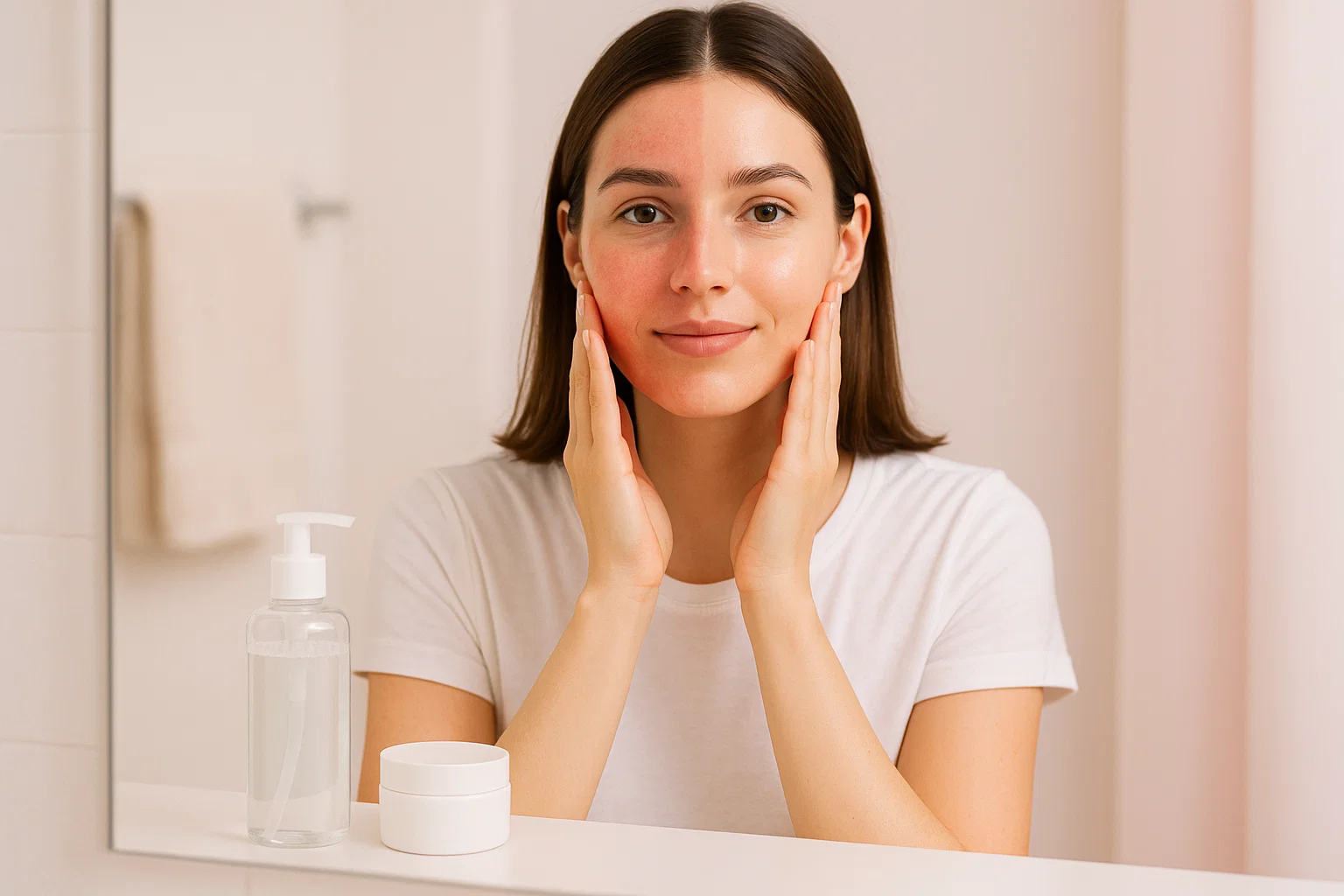
1. Over-Cleansing or Using Harsh Face Washes
Many believe that washing the face frequently will eliminate oil and acne, but over-cleansing strips away the skin’s natural oils. This disrupts the protective barrier and triggers increased oil production, leading to more breakouts and irritation.
Dermatologist Tip: Cleanse twice a day — morning and night — using a gentle, pH-balanced cleanser that suits your skin type. Avoid alcohol-based products that can dry out your skin.
2. Skipping Sunscreen
One of the most common and damaging mistakes is neglecting sunscreen. UV radiation accelerates skin aging, causes pigmentation, and increases the risk of skin cancer. Even on cloudy days or when indoors, UV rays can penetrate windows and affect your skin.
Dermatologist Tip: Apply a broad-spectrum sunscreen with at least SPF 30 every morning, and reapply every 3–4 hours if you’re outdoors. Make it a non-negotiable part of your skincare routine.
3. Ignoring Your Skin Type
Not all products suit every skin type. Using a heavy moisturizer on oily skin or a drying cleanser on dry skin can disrupt your skin balance. Understanding your skin type — whether dry, oily, combination, or sensitive — is the foundation of any effective skincare routine.
Dermatologist Tip: If you’re unsure about your skin type, book a consultation with a dermatologist. At Dermacian, experts use detailed skin assessments to personalize treatments like HydraFacial that match individual skin needs.
4. Over-Exfoliating
Exfoliation removes dead skin cells, but overdoing it can damage the skin barrier, leading to sensitivity, redness, and breakouts. Physical scrubs with rough particles can create microtears in the skin.
Dermatologist Tip: Exfoliate only 1–2 times per week. Choose mild chemical exfoliants like AHAs or BHAs for gentle resurfacing without irritation.
5. Mixing Too Many Active Ingredients
In the age of social media skincare trends, people often layer multiple actives like retinol, vitamin C, and niacinamide — which can cause redness, dryness, and peeling if not used correctly.
Dermatologist Tip: Introduce new actives gradually. For example, alternate retinol and vitamin C on different days. Seek professional advice before combining strong actives.
6. Neglecting Moisturizer
Even oily skin needs hydration. Skipping moisturizer can trigger the skin to produce more oil to compensate, worsening acne. A good moisturizer maintains the skin’s moisture barrier and keeps it soft and supple.
Dermatologist Tip: Use a lightweight, non-comedogenic moisturizer for oily skin and a richer cream for dry skin. Look for ingredients like ceramides and hyaluronic acid.
7. Using Expired or Unhygienic Products
Expired skincare products lose their effectiveness and may harbor bacteria that cause infections or irritation. Similarly, using dirty makeup brushes, sponges, or jars can lead to breakouts.
Dermatologist Tip: Always check expiry dates, store products in a cool, dry place, and clean your applicators regularly.
8. Not Removing Makeup Properly
Sleeping with makeup blocks pores, leading to blackheads and dull skin. Makeup residues can also interfere with your skin’s natural repair process during the night.
Dermatologist Tip: Always double cleanse — use micellar water or cleansing oil first, followed by a gentle face wash to remove impurities completely.
9. Following Online Trends Blindly
DIY skincare remedies like lemon juice, toothpaste for acne, or coffee scrubs might sound appealing but can damage your skin. These harsh ingredients can cause burns, pigmentation, or long-term sensitivity.
Dermatologist Tip: Stick to dermatologist-approved ingredients and avoid experimenting with unverified “home hacks.”
10. Ignoring the Neck and Hands
People often focus solely on their face, forgetting that the neck and hands are equally exposed to sunlight and aging. Neglecting these areas can lead to visible wrinkles and pigmentation.
Dermatologist Tip: Extend your skincare routine — including cleansing, moisturizing, and sunscreen — to your neck and hands.
11. Not Being Consistent
The biggest mistake isn’t what product you use — it’s inconsistency. Skincare requires time and patience. Frequently switching products or skipping your routine disrupts progress and can cause new skin issues.
Dermatologist Tip: Stick to a routine for at least 6–8 weeks before evaluating results. Consistency is the key to achieving long-lasting skin health.
12. Ignoring Professional Treatments
While at-home care is essential, professional dermatological treatments can target deeper concerns like scars, pigmentation, or aging more effectively. Treatments such as Chemical Peels, Laser Therapy, or PRP Facials offer results that daily products can’t achieve alone.
Dermatologist Tip: Schedule professional skincare treatments periodically for enhanced results under expert supervision.
13. Using Hot Water for Washing the Face
Hot water feels relaxing but can strip away essential oils and disrupt your skin barrier. This leads to dryness, irritation, and redness — especially for sensitive skin.
Dermatologist Tip: Always use lukewarm water for cleansing to maintain the natural moisture balance of your skin.
14. Not Addressing Underlying Health Factors
Sometimes, skin problems stem from internal issues such as hormonal imbalance, stress, or poor diet. Simply applying creams without addressing these factors provides only temporary relief.
Dermatologist Tip: Maintain a balanced diet, manage stress, and consult a dermatologist for persistent issues like adult acne or pigmentation.
15. Forgetting Nighttime Repair
Your skin regenerates while you sleep. Skipping a nighttime skincare routine deprives it of vital nutrients and repair support.
Dermatologist Tip: Cleanse, moisturize, and apply a gentle night cream or serum to help your skin rejuvenate overnight.
Conclusion: Build Smarter Skincare Habits
Skincare isn’t about having a shelf full of products — it’s about understanding your skin’s needs and avoiding mistakes that disrupt its natural balance. From skipping sunscreen to over-exfoliating, small changes can make a big difference in how your skin looks and feels.
For personalized skincare plans, advanced acne management, or pigmentation solutions, visit Dermacian’s Skincare Treatment Page to explore dermatologist-backed treatments that deliver real, long-term results.